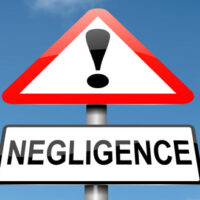Types of Negligence in Personal Injury Cases

Often, personal injury claims are the result of negligence. In legal terms, negligence typically occurs when someone fails to exercise a reasonable amount of care that a reasonably prudent person would have exercised under the same circumstances and causes harm. This is referred to as “ordinary negligence.” Often, when you hear the term “negligence” in a personal injury case, it typically refers to “ordinary negligence.” But there are other types of negligence in personal injury cases or other terms related to negligence. They are comparative negligence, contributory negligence, gross negligence, and vicarious negligence. In this article, we discuss these legal terms.
Elements Needed To Prove Negligence in a Personal Injury Case
In order to establish a claim of ordinary negligence, there are certain elements you must prove. The following are the four elements you must prove to have a successful ordinary negligence claim;
- Duty of care: This is the responsibility a person has to another person to act with caution and prudence. For example, motorists have a legal obligation to operate their vehicles in a reasonable manner to avoid causing harm to other road users.
- Breach of duty of care: You need to prove that the defendant failed to exercise the level of reasonable care a reasonably prudent person would have exercised in similar circumstances.
- Causation: The defendant’s actions must have directly led to your accident and injuries.
- Damages: You must have suffered actual harm or damages due to the defendant’s actions or inactions.
Types of Negligence in Personal Injury Cases
The concept of negligence can be broken down into different types of negligence. The following is a look at the different types of negligence;
Comparative Negligence
Comparative negligence laws state that multiple people can share fault after an accident or incident. Comparative negligence laws determine if a person can recover compensation in a personal injury case if they are partially to blame for their accident and injuries. With pure comparative negligence, a plaintiff can recover compensation regardless of the percentage of fault. However, a plaintiff’s compensation is reduced based on their percentage of fault. On the other hand, modified comparative negligence laws prevent plaintiffs from recovering compensation if their percentage of fault is above a specific threshold.
Contributory Negligence
Unlike comparative negligence, contributory negligence bars a plaintiff from recovering compensation if they bear any amount of fault. Only four states follow the contributory negligence law.
Gross Negligence
The term “gross negligence” describes more serious acts of negligence. It means that someone acted in a manner that demonstrates a reckless disregard for the safety and lives of others. If a person is found liable for gross negligence, they may be held responsible for a greater amount of damages than someone who is liable for ordinary negligence.
Vicarious Negligence
Vicarious negligence, also called vicarious liability, arises when you seek to hold a third party liable for someone else’s actions. For instance, when you seek to hold an employer liable for their employee’s actions.
Contact Us for Legal Help
Our Miami personal injury attorneys at The Pendas Law Firm can help you navigate the personal injury claim process. We can help you establish all the elements of your negligence claim. Contact us today to schedule a consultation.
The Pendas Law Firm also represents clients in the West Palm Beach, Daytona Beach, Fort Lauderdale, Fort Myers, Orlando, Ocala, Tampa, Bradenton, Jacksonville, Naples, and Melbourne areas.






